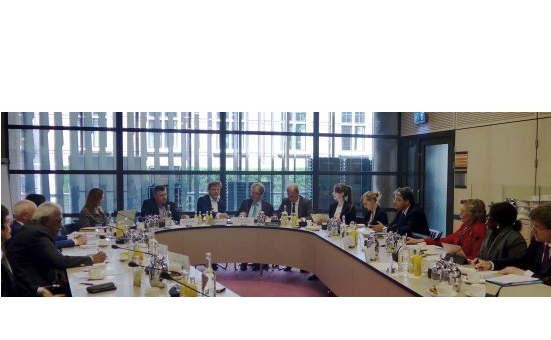DISARMAMENT & SECURITY .
An article by the Campaign for a United Nations Parliamentary Assembly [highlights by CPNN]
At an event convened by Parliamentarians for Global Action (PGA) in The Hague on May 15, representatives of regional parliaments, the Inter-Parliamentary Union (IPU), the Campaign for a UN Parliamentary Assembly (UNPA) and academia came together to explore mechanisms to increase democratic representation and accountability of the United Nations.

Click on photo to enlarge
The Roundtable that was hosted by the House of Representatives of the Netherlands with the support of the Ministry of Foreign Affairs of the Netherlands provided an opportunity to exchange ideas and to assess options like the creation of a UNPA or an improvement of existing mechanisms. The opening remarks were delivered by the even’s co-hosts Pieter Omtzigt, a member of the Dutch House of Representatives, and Nico Schrijver, member of the Dutch Senate, both of which are also members of the Parliamentary Assembly of the Council of Europe.
The first panel was started with a presentation by Andreas Bummel, coordinator of the UNPA Campaign, who stressed the need for creating a formal parliamentary body at the UN that would provide new space for members of parliament to be involved in the UN’s work. He said that the campaign’s goal was a UNPA vested with distinctive rights and powers that could be created, in a first step, by the UN General Assembly based on Article 22 of the UN Charter. He suggested that the apportionment of seats should be based on the principle of “degressive propotionality” which means that on a sliding scale smaller states would get more seats per capita than larger ones.
According to the second speaker, Anda Filip, Director of External Relations at IPU, the IPU already attempts to bring the voices of parliaments and parliamentarians to the UN and its agenda. She said that going through the IPU as an institution separate from the UN would maintain a clear separation of powers and promote independence and autonomy. She suggested that existing tools provided for by the IPU should be strengthened instead of creating new institutions.
Hans Köchler, Professor emeritus at the University of Innsbruck and President of International Progress Organization, elaborated on the democratic deficit at the UN, in particular with respect to the Security Council and the veto privilege of its five permanent members. He argued that a UNPA would represent an important step towards making the UN more democratic and raised the idea that such a new body might be better suited to monitor and oversee actions and decisions of the Security Council.
(continued in right column)
Proposals for Reform of the United Nations: Are they sufficiently radical?
(continued from left column)
Subsequently, Charles Santiago, a member of parliament from Malaysia, shared his experiences as legislator and chair of the ASEAN Parliamentarians for Human Rights (APHR) whose objective is to investigate and raise awareness of human rights violations in the Asian South Eastern states. In particular, he elaborated on the difficulties of establishing an inter-parliamentary assembly with consultative powers within ASEAN, given that member states insist on the principle of non-interference in domestic affairs.
The second session on lessons-learned from regional parliaments and organizations was opened and facilitated by Margareta Cederfelt, member of parliament from Sweden, Chair of PGA’s International Council and member of the Parliamentary Assembly of the Organization for Security and Co-operation in Europe (OSCE). As an introduction, Mrs. Cederfelt briefly explained the mandate of the OSCE which consists of 57 participating states from Canada to Mongolia.
Among other things, the panelists discussed the added benefits of regional parliaments and the challenges that arise from working in both regional and national parliament at the same time. According to Felipe Michelini, a former member of parliament from Uruguay and of the Latin-American Parliament, it was PGA and not regional parliaments that helped mobilize legislators so that Latin-American countries would join the International Criminal Court despite pressure from the US against doing so.
The Vice-President of the Pan-African Parliament (PAP), Bernadette Lahai, shared her experiences in the African parliamentary body and as a member of the ACP-EU Joint Parliamentary Assembly, a transregional parliamentary body created to democratize the framework of development cooperation. She discussed the structure of PAP, how members are elected and the roles they fulfill. Based on this she provided examples of the roles that a UNPA could play such as monitoring implementation processes and making recommendations to the UN General Assembly. She suggested that the preparations for the creation of a new parliamentary body at the UN would benefit from studying the powers and operations of existing international parliamentary bodies.
The second session ended with remarks from Niels Blokker, a Professor at Leiden University and former Deputy Legal Advisor at the Dutch Ministry for Foreign Affairs, who presented his research on different types of international parliamentary bodies. With regard to a UNPA he raised questions such as whether each state should have the same number of MPs or if it should vary by population size or whether or not the body should have budgetary or legislative powers.
The event was concluded by Mr. Schrijver and David Donat Cattin, Secretary General of PGA. As PGA’s summary of the event points out, they highlighted “the necessity of parliamentary representation in the form of a decision-making or advisory body to the UN.” At the same time, they emphasized the importance of further examining existing methods and their effectiveness. Participants were called upon to engage with this topic at the national and international levels, in particular, to determine which existing models of regional parliamentary bodies may serve as inspiration for a UNPA.